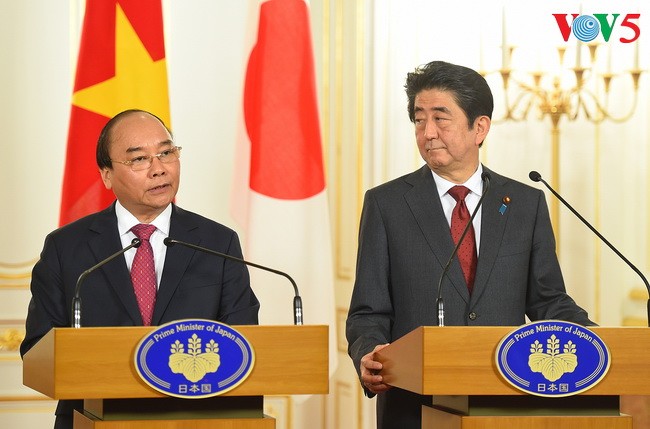Vietnamese, Japanese PMs agree on orientations for future ties
(VOVWORLD) - Following a talk between Prime Minister Nguyen Xuan Phuc and Prime Minister Shinzo Abe, the two leaders met with the press.

Prime Minister Nguyen Xuan Phuc (left) spoke at the press conference.
|
Mr. Phuc said both sides have issued a joint statement on orientations and measures to deepen the extensive strategic partnership between Vietnam and Japan: “ Vietnam and Japan have agreed to enhance political trust. Vietnam considers Japan an important and long-term partner. The two countries have maintained delegation visits and exchanges at all levels, and worked together to organize a 45th anniversary celebration of their diplomatic ties in 2018. The two sides have discussed various measures to promote their economies, and Japanese investment in Vietnam. Prime Minister Abe says Japan will continue to support Vietnam in developing its economy, focusing on infrastructure building, human resource training, and response to climate change”.
Prime Minister Abe welcomed Prime Minister Nguyen Xuan Phuc as a close friend on his second visit to Japan in the role of Prime Minister. Mr. Abe said Japan highly appreciates cooperation with Vietnam, especially in security and defense. Last month, Japan’s destroyer Izumo visited Cam Ranh port. Mr. Abe said Japan will support Vietnam’s maritime law enforcement by providing new patrol ships: “Against a wave of protectionism and fear of globalization, Prime Minister Nguyen Xuan Phuc and I will promote free trade and investment. I have proposed that Japan help Vietnam organize the APEC Summit in Da Nang in November. The two countries will work closely with each other to realize the Trans-Pacific Partnership Agreement and implement the Regional Comprehensive Economic Partnership Agreement”.
Speaking of the East Sea, Prime Minister Abe said he shares Prime Minister Phuc’s view on the importance of dialogue between related parties based on international law and preventing any unilateral change to the status quo.